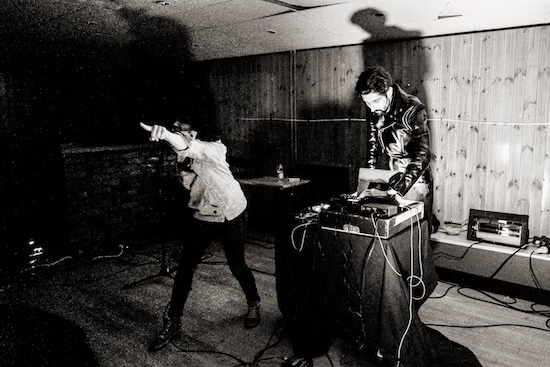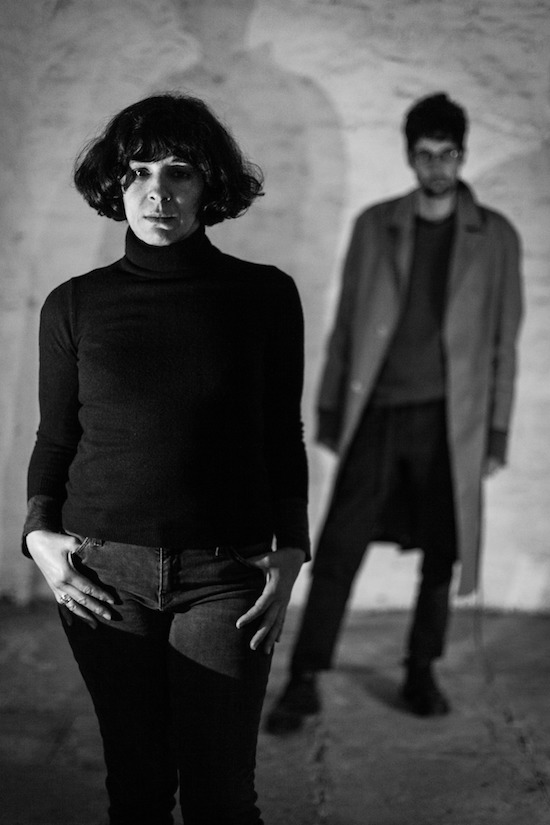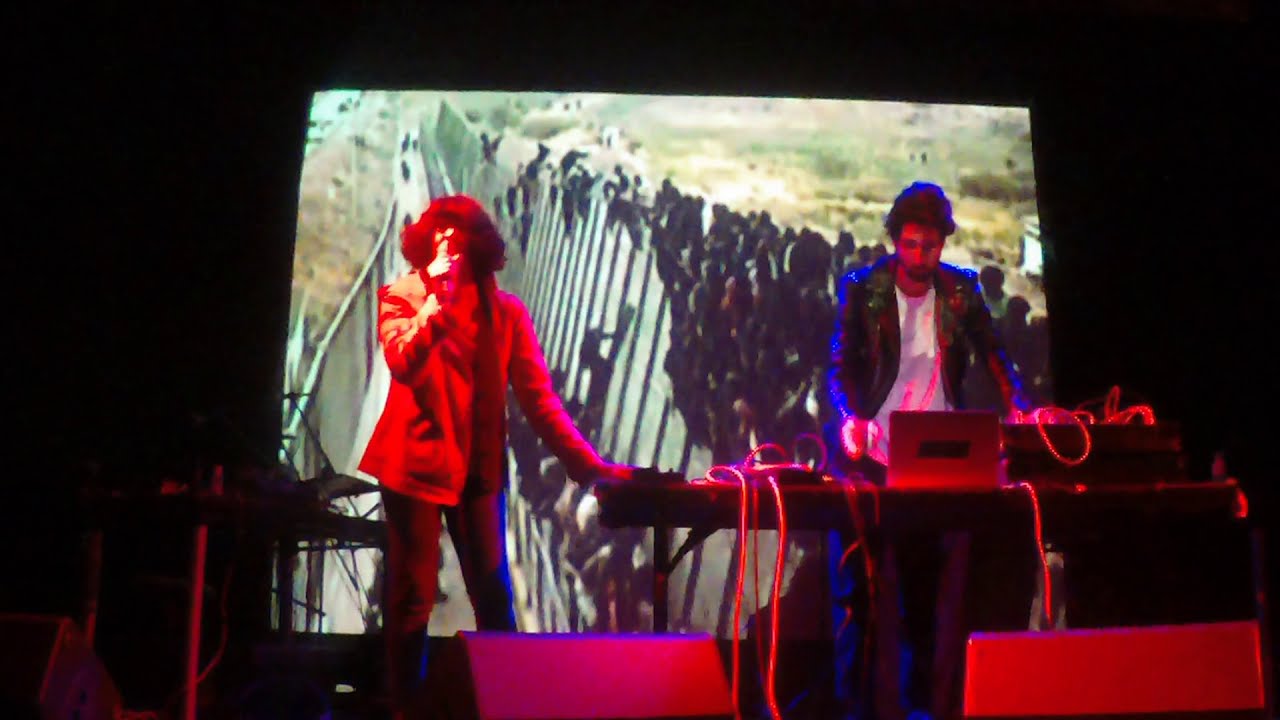HARRGA portrait by Adam Reid
In these years of disquietude, we are never far from examples of ‘bad political music’: twee platitudes, toothless commentary and sonic conservatism.
Those jaded by this state of affairs might find respite in the keen awareness and fevered imagination of industrial duo HARRGA, the latest project currently coming to prominence in Bristol’s vital experimental scene. Combining Dali de Saint Paul’s multilingual vocals with the bludgeoning electronic compositions of Miguel Prado, their recent debut album Héroïques Animaux de la Misère offers a literate and lacerating exploration of the current migration crisis. Boasting a guest appearance from Moor Mother, the record appeared last month on Avon Terror Corps – a Bristol ‘crew label’ comprising local avant-garde luminaries such as Bokeh Versions and Giant Swan.
I had previously understood that ‘harrga’ means ‘to burn’ in the Arabic dialect Darija, and is used colloquially to describe North African asylum seekers’ practice of torching their ID papers before crossing borders. De Saint Paul corrects me, saying that it more literally means “a burn”, evoking “a deep wound that scars your body”. “When people cross borders of different kinds”, she says, “they are left with wounds which cannot be hidden, and shape their identity with elements of both strength and fragility”. While HARRGA’s first release Héroïques focuses on the horrors of the refugee crisis, she claims the project more widely aims to explore “human experiences, and what is left of humanity”.
Language plays a central role in the project, with De Saint Paul delivering her lyrics in a combination of French, Darija, and a little English. This, she explains, is partially a means of challenging audiences’ openness. “Languages are weapons!” she declares, citing their power to both communicate and disorientate. “Expose yourselves to others and their ways of expressing pain or love, but also feel what is left of communication when your own comfort is broken – feel weak and stupid!” To ignore the importance of languages, she argues, “is to be part of the supremacy”.
The album’s title, based on a novel by Pierre Guyotat, translates as ‘Heroic Animals of Misery’: a phrase Prado claims is designed to evoke a “sardonic attitude omnipresent in the moral superiority of modern Social Democracy”. He cites “an alarming tendency to mythologize refugees and migrants as eminently noble because of their pain and misery”, when all they are trying to do is survive.
In exploring this concept, HARRGA’s sound is one of apocalyptic distress, premised upon searing, abstract noise-design. “The sound of these songs”, Prado explains, “walks a dangerously thin line between an emphatic sonification of terror and the opportunities for regarding critically (at a distance, through the artistic medium) human suffering taking place throughout the world”.
This is complicated, he notes, by their membership to the privileged middle classes of Western Europe. While HARRGA aims to pay tribute to refugees, the duo insists that they do not intend to speak for them. “I am talking for me, as if I was myself one of these people termed by others as animals” De Saint Paul says. Repeatedly screaming “Primitive!” on the song ‘Artaud’, she signals an effort to unsettle notions of ‘civilised’ humanity and “make tangible that which is left of humanity when facing this extreme struggle to survive: RAGE! Rage to survive”.
Prado further describes the often-contradictory narratives which are constructed around the refugee crisis. It was whilst recording Héroïques that the media began circulating the story of the ‘Spiderman Of Paris’ Mamoudou Gassama, a Malian refugee who – after scaling a Parisian building to rescue a child – was given a medal, French citizenship and an internship with the Parisian fire service. To Prado, this highlights “the hypocrisy of Europeans in their perception of migrants”, who simultaneously demonise the efforts of refugees to escape possible death by scaling “rows of six-metre-high barbed-wire fences (designed to penetrate skin and sever nerves) surrounding Ceuta and Melilla”.
‘Melilla’, the Spanish enclave in North Africa used by asylum seekers to enter Europe, also provides the name for the album’s opening track – a haunting piece of noise concrète featuring field-recorded shouts from the city. Prado explains that the repeated call “Boza!” means “victory” in Bambara, and can be heard when sub-Saharan migrants successfully cross the European border. De Saint Paul describes this border’s protection with razor wire as nothing short of criminal: “To injure or mutilate people will not solve immigration."

HARRGA live by Simon Holliday
De Saint Paul’s extraordinary use of her voice on Héroïques spans spoken word (‘War’), tortured whines (‘Lava’) and impassioned crooning (‘Phone Recording’). Often singing non-verbally as ringleader of improvisational circle EP/64, which has included members of GNOD, Yama Warashi and Silver Waves, she claims to develop her vocal performances intuitively. “Words came easily as soon as I was exposed to our music: they were strong and clear. Horror is not finely shaded”. Prado has also embarked on vocal experiments with his project ‘Evacuation of the Voice’, believing that performatively ‘evacuating’ the voice can give us an outsider’s perspective of our own subjectivity; experimenting with vocal delivery is thereby endowed with psychological, neurobiological and political significance.
Live, the duo are utterly compelling – De Saint Paul convulsing wildly, while Prado delivers cacophonous blasts from behind his laptop. Their performance at Howling Owl Records’ final ‘New Year: New Noise’ festival was watched by Moor Mother, who would become a supporter and eventually contribute a verse to Héroïques’ closing track ‘À Vif’. “She is a poet – this is far too rare in our society”, De Saint Paul declares.
At his subsequent residency at EMS Stockholm, Prado created a sound recalling a plague of locusts which Moor Mother loved, and formed the basis of this song. “She provided the first lyrics and vocals, which then influenced Dali’s verses” he says. “I think this is not going to be the end of our work together”.
Héroïques was released on Avon Terror Corps, whose spellbinding compilation Avon Is Dead brings definition to this exciting moment in Bristol’s experimental music. When I ask HARRGA about the label – whose affiliates range from ‘psychosexual cassette slingers’ Bad Tracking to ‘cyborg industrial trap’ duo Kinlaw & Franco Franco, they laud it as a vital support network. “We live in a moment of incredible precariousness in the music industry”, Prado says. “We should organise ourselves more in terms of a criminal organisation, at least at the level of its collective problem-solving”.
Perhaps the album’s finest moment is ‘La Mer’. Taking its name from Charles Trenet’s famous love song for the sea, De Saint Paul explains that HARRGA’s version “presents the fear and last hopes of people trying to cross the Mediterranean” in terrible conditions. She notes a 2008 news story from Naples, in which two young Roma girls drowned before a beach full of indifferent sunbathers. On its initial release, ‘La Mer’ was accompanied by images from Italian designer Marta Monge’s 2017 book The Every Migrant’s Guide To Illegal Border Crossings, showing Bangladeshi migrants trying to cross the river Padma with DIY floatation belts.
Incidentally, the epigraph that opens this guide comes from another work concerned with ‘burning’, Ray Bradbury’s Fahrenheit 451. “We need to be really bothered once in a while”, it states, and I ask how far HARRGA’s music supports this idea: that unsettling people can be a route to engaging them constructively. “You have to create emotions to make things tangible”, De Saint Paul replies; by being discomforted, their audiences are made aware of the comfort they take for granted.
“The dehumanisation of the refugee is always a process of our own dehumanisation”, Prado explains. “It is important to remember that what makes human beings alike is the fact that, as Jean-François Lyotard said, ‘every human being carries within him the figure of the other. To banish the stranger is to banish the community, and you banish yourself from the community’”.



